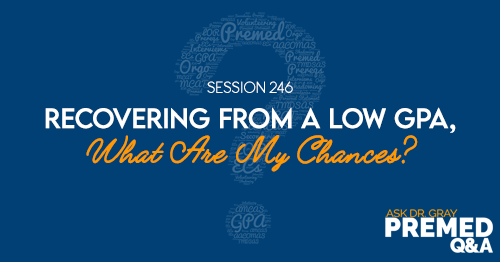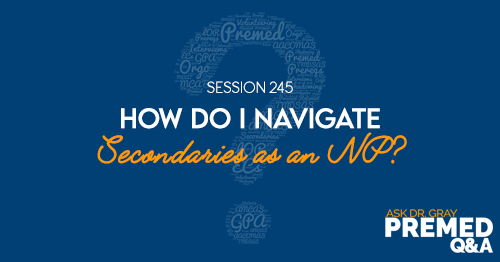Apple Podcasts | Google Podcasts
Session 140
Today’s student is worried that her GPA isn’t high enough in light of her background. But can she prove her academic ability despite her GPA inconsistency?
Listen to this podcast episode with the player above, or keep reading for the highlights and takeaway points.
The episodes in this podcast are recordings of our Facebook Live that we do at 3 pm Eastern on most weekdays. Check out our Facebook page and like the page to be notified. Also, listen to our other podcasts on MedEd Media. If you have any questions, call me at 617-410-6747.
[00:23] Question of the Day
“I come from an Asian American background. I’m Indian. And so, I know that you usually say that there’s no such thing as an overrepresented majority in medicine. But all these premed forums have scared me a little bit.
My GPA just doesn’t feel like it is where it needs to be based on my background and I’m applying this upcoming cycle. If I’m ready to apply, do I need to do a postbac? Where am I at?
I transferred colleges in between, so I had a little bit of difficulty, which is why I didn’t have that steady upward trend. It stayed constant sophomore and junior year. But that’s where I’m sort of at at the moment.”
So our student’s cumulative GPA is a 3.65 and her BCPS is a 3.44. When I asked her about her trands, she says, she started off with a 3.3 then went up to a 3.6, and senior year is at 3.96.
For her science GPA, her freshman year was a 3.2. Sophomore was a 3.4. Her Junior year took a little bit of a dip of 3.1, and then Senior year is a 3.9.
[02:05] Consistency is Key
Our student definitely has a solid finish, but the question from the admissions committee here is who is she? Which one of these four years is she – the 3.9 student or the 3.1 student? And that’s because she doesn’t have a consistent upward trend so they’re not really going to have an answer to that. In other words, she has not proven that she’s a consistent 3.9 student because she’s all over the place.
Now, this is the perfect student that would benefit most likely from doing some more coursework, and proving that she’s the 3.9 student.
Your GPA, regardless of anything else, has shown that you’re not consistent enough for a medical school to know who you are. If your overall science GPA was a 3.7, it wouldn’t be a concern. 3.7 is solid.
[04:31] MCAT is Not Equal to GPA
Q: “Where does the MCAT factor into showing medical schools that I am capable of medical school level coursework?
A: The MCAT shows that you can do well on the MCAT. And the AAMC has some data out there that tries to correlate the MCAT with USMLE. There are some other people out there with very weak correlation to USMLE performance.
But the big picture here is that it doesn’t matter anymore as to whether there’s some correlation between MCAT and USMLE, because USMLE is going pass/fail.
'Don't use the MCAT as a counter to having a lower GPA. It doesn't work that way.'Click To TweetThere’s no sliding scale that says, if you have a 3.4, you must have a 515 then they won’t care about your 3.4 anymore.
When you think about how medical schools often use rubrics, they’ll correlate a 3.0 to a 3.2 GPA with five points. And then a 3.2 to a 3.5, with seven points to the rubric, whatever it is. And then they do the same thing with the MCAT. They’ll say, 500 to 505 is five points. 505 to 510 is 10 points, and so on.
At the end of the day, a higher MCAT score always helps and a higher GPA always helps. There’s no such thing as a higher MCAT score helps a lower GPA – it’s just a higher MCAT score helps – period.
[06:35] Taking Additional Coursework
Q: “Given the information you’ve provided, do you think it’s still wise to apply and perhaps take some coursework in the meantime? I know not all schools allow updates, but to potentially send updates to schools and let them know where I’m at academically?”
A: It’s really a personal decision for you. If you choose to apply this cycle, it’ll be with your GPA right now. And that’s the GPA that you’ll have to just assume that schools are going to make their decisions based off of.
Assuming you don’t get in and you’ll need to reapply, think about having to redo all of your personal statement, extracurriculars, activity section, etc. to show growth. Plus, you also have to consider the cost of the finances to apply again.
Or would you rather just take the classes you need and take the time to prepare for the MCAT as well as all of your essays and all that stuff without rushing?
These are two different options.
“I would just wait to apply than apply with a weaker application knowing that I'm actively working and improving my application in the middle of an application.”Click To Tweet[08:35] Credit Hours Needed
Q: “In terms of doing extra coursework, how many courses or how many credits would be sufficient?”
A: My colleague, Dr. Scott Wright, who’s a former director of admissions at UT Southwestern on our Ask the Dean series, mentions 45 credit hours. That means 45 credit hours of a solid upward trend. Now, that doesn’t mean 45 credit hours of a postbac. That just means 45 hours of an upward trend. And so your last year is part of that.
Currently, our student has about 24 to 28 credit hours. So my advice is to add a year onto that, which is about the same credit hours she has now and having that solid upward trend.
[09:52] Looking Beyond the Stats
Q: “In terms of my experiences, I have some good clinical hours. I’m just trying to gauge where I’m at beyond my academics. I know you also do say that stats aren’t the whole picture and your story also matters.
Where do you think that factors in for me if I do end up going the path of applying this cycle and using my story and the holistic part of my application to really show who I am beyond my stats?
Do you think that medical schools will understand the story of I transferred from a college that I truly was not happy at and that sort of reflected in my grades? I transferred to the new university that I’m now at where that science GPA took a downtick. And so, if I’m able to explain that, is that something that could create a more vivid picture of what these numbers are trying to represent?”
A: When I say that your story matters and grades aren’t everything, that’s always predicated with – you still have to show that you’re academically capable of doing well in medical school.
And so, a student could have a 3.2 GPA as a final number, which most students only talk about, discuss and see. But that 3.2 could include 60 hours at a 4.0. And that student has proven academically they can handle medical school.
“You can't explain away a low GPA if you still haven't proven you can handle medical school.”Click To TweetEven if you have the best extracurricular activities or the best MCAT score, there’s still going to be a little bit of hesitation around how you are academically ready for medical school.
[13:43] Taking COVID Into Account
Q: “The 3.1 did come during the pandemic, which was a tumultuous time for I think, most if not all students. Do you think medical schools are taking into account that spring 2020 semester, where there might be some crazy fluctuations?”
A: A: They’re just going to look at that number. It’s too much brain power to think about your specific situation. A lot of students honestly switch to pass/fail that cycle or that semester. A lot of students aren’t going to have the worst GPA that semester because they switched to pass/fail. Either they were forced to or they were given the option, whatever that looks like.
[15:59] The Fallacy of Sunk Costs
The fallacy of sunk costs means that you are so invested into something that even though you should stop doing it, you’ve already spent X amount of time or money doing this, and so you might as well see it through.
'A lot of students get trapped in this fallacy of sunk costs.'Click To TweetYou’ve already opened up your application for this year and you’ve already written your personal statement. You’ve already asked for letters of recommendations. And if you’re not applying this cycle, what are your parents and friends going to think?
And so, you get down the rabbit hole that there’s no turning back in your mind. Again, what you’re doing is you’re putting a half effort in your application just knowing that.
This is why we have so many students not getting into medical school every year because a lot of students apply with a half complete application.
Links:
Medical School HQ Facebook page
Medical School HQ YouTube channel
Instagram @MedicalSchoolHQ
Join the Application Academy!
The Premed Playbook: Guide to the Medical School Personal Statement
The Premed Playbook: Guide to the Medical School Application Process
SEARCH SITE
LISTEN FOR FREE












